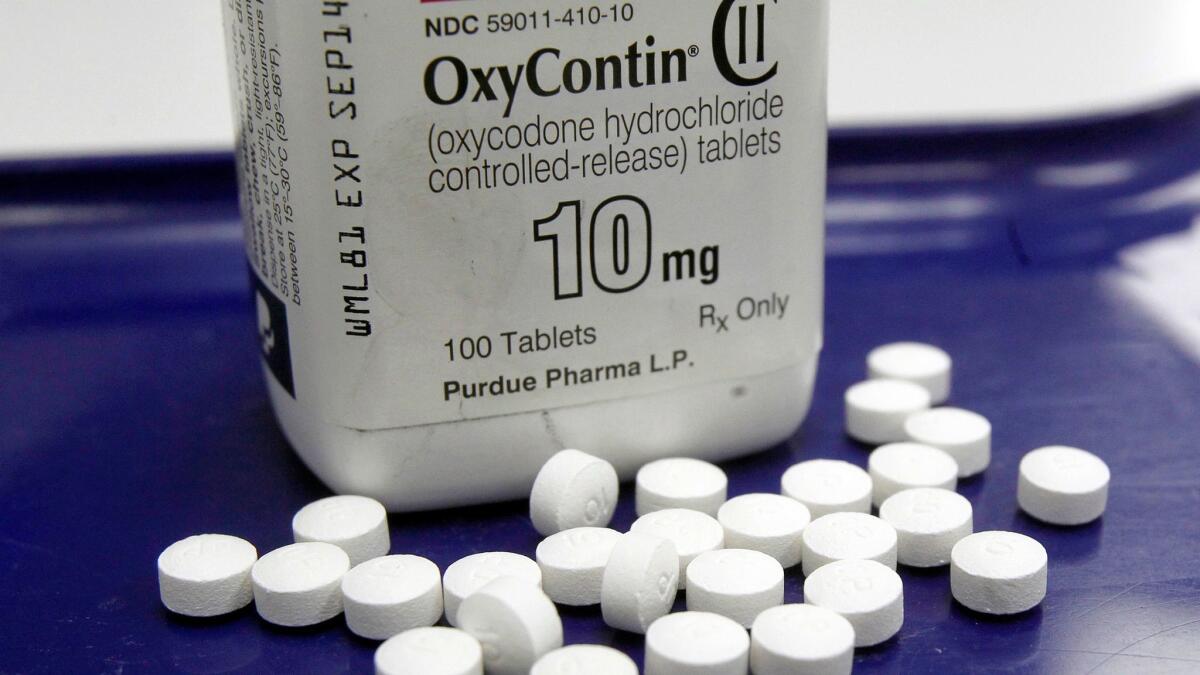Congressional representatives warn WHO of OxyContin maker’s global push

- Share via
Members of Congress called on the World Health Organization Wednesday to “do everything in its power” to stop the manufacturer of the highly addictive painkiller OxyContin from setting off “a worldwide opioid epidemic” with its rapid expansion into developing countries and other foreign markets.
In a letter to the WHO’s director-general, a dozen U.S. representatives from areas devastated by opioid addiction urged the international medical community to be wary of Connecticut opioid maker Purdue Pharma and its international arm, known as Mundipharma.
“The greed and recklessness of one company and its partners helped spark a public health crisis in the United States that will take generations to fully repair,” they wrote of the opioid epidemic, which has claimed more than 300,000 lives since 1999. “Please learn from our experience and do not allow Mundipharma to carry on Purdue’s deadly legacy on a global stage.”
The letter noted a Times report last year about the foreign marketing push by Purdue’s owners, the Sackler family. As OxyContin’s sales have plunged 40% in the U.S. in recent years, the family’s Mundipharma companies have begun shifting their painkiller business into Latin America, Asia, the Middle East, Africa and other places. The marketing there includes many of the same controversial sales tactics as in the U.S., including minimizing the painkillers’ risk of addiction, the newspaper found.
In a statement through a spokesman, Purdue said that the various Sackler-owned companies around the world operate “under different leadership structures” and “within distinct regulatory environments.”
“Here in the U.S., Purdue is committed to working collaboratively with public officials to address the opioid crisis,” the company said, adding, “we are an industry leader in the development of abuse-deterrent technology and advocating for the use of prescription drug monitoring programs.”
Representatives for Mundipharma did not have immediate comment Wednesday. Purdue has said it is working to end the U.S. opioid epidemic through abuse-deterrent pills and other strategies. Mundipharma has defended its foreign marketing practices, saying that it learned from the American experience and “is committed to developing prescription medicines for healthcare professionals to treat patients in pain safely and responsibly.”
Representatives for WHO Director-General Margaret Chan did not immediately respond to a message seeking comment. The U.N. agency’s primary focus when it comes to opioid painkillers has been expanding access to the drugs in countries where supplies of them are so limited that hospitals don’t have morphine and the terminally ill routinely die in agony. Only a small number of countries, such as the U.S. and Canada, have embraced broadly prescribing painkillers and seen problems with widespread abuse.
In their letter, lawmakers noted OxyContin’s role in igniting America’s opioid epidemic. Purdue launched the drug in 1996 with an aggressive marketing campaign that deceived doctors about its risk of addiction. The company and three executives pleaded guilty in 2007 to federal charges of misbranding drugs and were ordered to pay $635 million. Investigations in The Times last year revealed that a problem with OxyContin’s duration put some patients at increased risk of addiction and described how the company collected evidence pointing to criminal trafficking of its drug, but failed in many cases to alert law enforcement or shut off the supply of pills destined for drug dealers and addicts.
More than 7 million Americans have abused OxyContin since its debut, according to federal estimates, and research indicates that addiction to the drug has been a key driver in the nation’s skyrocketing rates of heroin abuse.
“The international community has a rare opportunity to see the future,” the lawmakers wrote. “Do not allow Purdue to walk away from the tragedy they have inflicted on countless American families simply to find new markets and new victims elsewhere.”
The letter was a bipartisan effort reflecting the disparate communities affected by the opioid epidemic. It was spearheaded by Rep. Katherine Clark, a liberal Massachusetts Democrat whose district includes well-off Boston suburbs, and Rep. Hal Rogers, a conservative Kentucky Republican whose Appalachian district is one of the poorest in the country. Opioid death rates in both states are surging, with Massachusetts recording nearly 2,000 deaths last year and Kentucky more than 1,200 the prior year.
“The cause of it lies right at the door of Purdue and its misleading marketing,” said Clark, adding that when lawmakers learned of OxyContin’s global ambitions, “we just couldn’t stand by and not try to intervene.”
Rogers said in an email that he was moved to act in part because of parallels between his district with its poverty and limited access to healthcare and developing countries with a similar lack of resources.
“I think we have a moral duty to warn our neighbors about the greedy and heartless marketing practices of Purdue and Mundipharma,” he wrote.
Brandeis University researcher Andrew Kolodny, a longtime critic of the pharmaceutical industry’s role in the opioid epidemic, spoke at the WHO’s Geneva headquarters in 2014.
He said some officials present had long worked to increase supplies of morphine in countries with little or no access to the drugs and seemed dubious that their broad use had caused so much damage in North America.
“My presentation was greeted with skepticism,” Kolodny recalled.
In discussions since then, he said, WHO officials have showed more interest in the problem. An agency magazine, the Bulletin of the World Health Organization, published an article recently about the crisis.
“Things are changing slowly and I think the letter will be very helpful,” Kolodny said.
UPDATES:
11:45 a.m.: This article was updated with additional details and comment from Purdue Pharma.
This article was originally published at 10:15 a.m.
More to Read
Sign up for Essential California
The most important California stories and recommendations in your inbox every morning.
You may occasionally receive promotional content from the Los Angeles Times.











